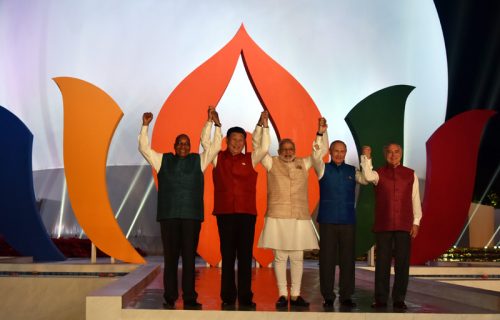India’s presidency of the BRICS grouping of emerging powers has come to an end after a packed year of more than a hundred events, meetings, and conventions. The highlight was the meeting of the Heads of States organised in Goa on 15-16 October where all the leaders of BRICS countries were in attendance.
International developments in the past couple of years have squarely put the spotlight on the constituent countries of the BRICS forum. Russia’s expanding role in Syria, China’s One belt One Road initiative, which will have massive economic and political implications for Eurasia, South and South East Asia and Africa, and the centrality of India’s and China’s emission pathways to the success of the international climate agreement have accorded these countries a central role in some of the major global challenges of our times.
But the BRICS forum itself has faced questions of continuity for some time now, and the considerable slowing down of their economies, increasing antagonism and strategic clashes between China and India, as well as the pre-eminence of the growing Russia-China partnership have further reinforced these doubts.
Seen in this context, the BRICS governments’ push to further institutionalise and consolidate their progress is an indication of the importance they still attach to the forum, and a decade since coming together, they seem poised to expand beyond being an economic grouping demanding a seat at the high table to substantial cooperation in other sectors.Within last year, BRICS countries greatly diversified their cooperation through working groups on counter terrorism, employment, environment, agriculture, health, economy and trade, education and vocational training, anti-corruption, infrastructure, information and communication technologies (ICTs), and energy.
Read More









